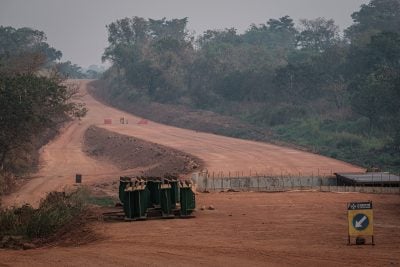Foreign investors are ramping up investment in Lesotho’s cannabis industry with the aim of making the southern African country a production hub for medicinal cannabis, which was legalised in the country in 2017.
US cannabis oil and concentrates manufacturer Halo Labs has announced plans to buy one of Lesotho’s largest cannabis producing companies for $18.4m.
Under the deal Halo will acquire 100% of shares in Bophelo Bioscience & Wellness and will take over production of their 5-hectare cultivation and production site.
Once fully operational, Bophelo’s 5 hectare site plans to produce almost 5,000 kgs of cannabis worth around $46m annually.
“We expect the initial planting to occur in November and to complete our first harvest by the second quarter of 2020,” says Kiran Sidhu, CEO of Halo Labs.
The end product will be compliant with EU manufacturing practices, which is Halo Lab’s intended export market, he adds.
The state has also given Bophelo preliminary approval to expand up to 200 hectares and may consider granting permission for outdoor growing from 2019, Sidhu says, which will grow the company’s output and exports.
Lesotho’s high-altitude climate and low-cost labour and land make the country fertile ground for the continent’s budding cannabis industry.
“The high-altitude, low-humidity climate and access to water, as well as low cost utility, tax, and labor rates mean cannabis in Lesotho can be cultivated naturally at a very competitive cost,” Sidhu explains.
Lesotho’s budding weed market
In May 2017, Lesotho became the first African nation to grant a licence to grow medical cannabis legally. The licence permits the manufacture, supply, export, and transport of medical cannabis and cannabis products from Lesotho, according to strategic cannabis consulting firm Prohibition Partners 2019 African Cannabis Report.
There are currently more than 20 licensed companies operating in Lesotho’s cannabis industry, Dallas McMillan the CEO of US-based Rhizo Sciences, an investors in Africa’s cannabis market tells African Business.
“Estimating the size of the industry is a challenge, as so few people have licenses, and those that do vary from having no active operations through to large facilities but not sales to date,” says Dr. McMillan.
“As a result the output of the industry is basically zero, but there would be hundreds of companies attempting to get licenses or engaged in other serious activity.
Currently only large businesses can afford the hefty US $37,000 licence fee, marginalising small-scale farmers who are still cultivating it illegally, Prohibition Partners’ cannabis report says.
In response around 80 licenses have been issued to Lesotho nationals as part of a government drive to encourage local entrepreneurs to participate in the local medicinal cannabis industry, Louisa Mojela the CEO of Bophelo told African Business from Lesotho.
But a lack of industrial infrastructure and funds makes its hard for small-scale farmers to turn a profit, she adds.
“Many license holders are struggling as the cannabis business is highly technical and capital intensive.”
“The government is supporting private sector initiatives that will [build the capacity] of smallholder farmers to become commercial out-growers.”
In Lesotho, the country’s new law lays out who can prescribe medical cannabis and under what conditions, but lacks the legal and regulatory frameworks for creating and sustaining a workable and inclusive domestic cannabis industry and export environment, according to the Prohibition Partners’ report.
With the right legislation and regulation in place, Africa’s cannabis market has the potential to be worth $7.1bn annually by 2023, they predict.
“[Africa’s] current market size is realistically in the millions at best. The black market is worth billions and some African nations are the highest consumers of cannabis globally,” McMillan adds.
In the rest of the continent, DRC, Zimbabwe and Malawi have started issuing licenses while Uganda, Rwanda and Kenya are in the process of laying the legal groundwork to legalise production.
There are currently 5-10 licensed companies operating in Zimbabwe (with more to come), more than 3 in South Africa and a handful in other states – often only doing R&D with no current approval for commercial operation or export, Mojela at Bophelo says.
Influx of foreign investment
Halo Lab’s latest investment in Lesotho follows those of some of the world’s largest cannabis companies in the country in recent years.
Last year Canada-based Supreme Cannabis invested $10m in another of Lesotho’s licensed producers Medigrow.
In June last year Canadian Canopy Growth Corporation also snapped up Lesotho’s Daddy Cann company for $28.8m. The company has a license to cultivate, manufacture, supply, store, import, export, and transport cannabis and cannabis resin.
In 2017 US-based Rhizo Sciences partnered with Medi Kingdom Holdings to build a $45m medical cannabis export facility in the country.
Marijuana is currently illegal in Lesotho, but in 2017 the government granted its first license to allow a company to grow medical cannabis.
This year the government also awarded licenses for the cultivation, processing, and sale of medical marijuana, and are currently laying the regulatory and legal groundwork to legalise exportation in an effort to become the continent’s leading producer and exporter of legal cannabis.
The cannabis grown in Lesotho and other parts of the continent is “probably produced for the African and regional market, because at the moment there’s such high barriers to entry into exporting in Europe or north America,” Eoin Keenan a consultant at Prohibition Partners told African Business.
“It will be a while before the right standards and regulations and international frameworks exists for African countries to export to those markets,” he says.
Look out for our in-depth report on Africa’s cannabis market in the upcoming July issue of African Business Magazine.
Want to continue reading? Subscribe today.
You've read all your free articles for this month! Subscribe now to enjoy full access to our content.
Digital Monthly
£8.00 / month
Receive full unlimited access to our articles, opinions, podcasts and more.
Digital Yearly
£70.00 / year
Our best value offer - save £26 and gain access to all of our digital content for an entire year!

 Sign in with Google
Sign in with Google 




